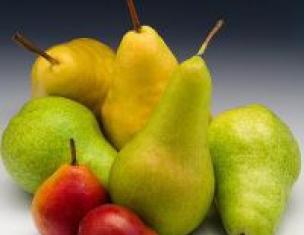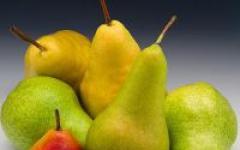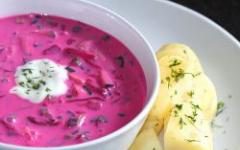While losing weight, every calorie is important! The more correctly you make your diet, the faster and brighter the results will be. It is necessary to take into account not only the caloric content of products, but also the nutrients that they contain. After all, it often happens that the weight is only due to reduced. The composition and caloric content of the pear makes this fruit an ideal assistant for those who seek to reduce weight.
Health Benefits
Thus, cancer cells and dangerous diseases can occur. Antioxidants in vitamins C and A, as well as in flavonoids and beta carotene, lutein and zeaxanthin help reduce harmful substances in the body. Pears also help in the synthesis of new tissue in various organs and cellular structures. Vitamin C is responsible for fruit. It helps to ensure a normal metabolism in the body and ensures that all functions are performed correctly.
On the other hand, wound healing is accelerated by ascorbic acid. Accidents caused by small blows or cuts can heal faster with the substances contained in the flask. In addition, repair of blood vessels is performed better. Therefore, you should often put pears in your menu.
Calorie pear
Like most plant products, pear has a rather low calorie content - only 42 kcal. Of these, 0.4 g of protein, 0.3 g of fat and 10.9 g of carbohydrates.
This allows you to use pears as a dessert on a diet. Without sweet foods, it is very difficult for many people to have a sweet tooth, and the majority breaks down. Instead of attacking an extraordinary cake, it is better to include pears in your diet - this harmonizes your diet, and most importantly, will suit your tastes.
Better blood circulation and red blood cell regulation
This vitamin has long been known to have a positive effect on the immune system. It also stimulates the formation and mobility of leukocytes. This fruit has been studied in numerous studies and is strongly recommended for a healthy diet. Pear also helps to treat simple diseases such as the common cold, flu, etc. arguments For many people suffering from anemia or a lack of minerals, pear consumption can be very beneficial. Due to the content of copper and iron in these fruits, other minerals are also better absorbed by our body, and iron values, as well as the number of red blood cells can be increased.
Considering the fact that the pear's calorie content is 42 kcal per 100 grams, one standard-sized fruit weighing 135 g carries in it 56 calories. Practically any other dessert, be it a cookie, cake, pastry, chocolate or other usual sweets, with the same weight will be much more high-calorie.
It should be noted that the caloric content of yellow pear (or, as it is also called, sand, Asian), is also equal to 42 kcal per 100 grams.
With iron deficiency, too little hemoglobin is produced, which can lead to anemia. With iron and copper-rich foods, you can relate to, among other things, fatigue, concentration disorders and muscle weakness. As already mentioned, pears contain a lot of iron.
Pear for diet
Pears give us a lot of fibers that have a positive effect on our heart. Studies have shown that these dietary fibers can reduce the level of cholesterol in the blood by binding gallium salts and then excrete them from the body. Pears can also help prevent stroke and reduce the risk by up to 50 percent.
Calorie dried pear
In the process of drying, dehydration occurs - the removal of moisture from the product. It is moisture that forms the basis of the weight of the fruit, so after such a procedure, the raw material becomes much easier, but the substances in it are concentrated, which causes an increase in the caloric content of the product.
For example, dried pear has a caloric content of 249 kcal. Because of this, it is recommended to use them for compotes, but not directly in dry form - this can cause a set of extra calories.
Anti-inflammatory pear
The combination of antioxidants and flavonoids in pears also has an anti-inflammatory effect. Fruits can help relieve pain caused by inflammation. This also applies to the treatment of diseases such as osteoarthritis, rheumatism, gout and the like.
Pear keeps our bones strong
The high content of minerals in pears can help us with possible bone loss, and also avoid diseases such as osteoporosis and the general weakness of bones throughout the body.
Pear is good for skin, hair and eyes
Pears contain large amounts of vitamin A, as well as lutein and zeaxanthin.Calorie apples and pears
Many believe that pear pearl apples. People make this false conclusion based on the taste of the fruit - because the pear is sweeter. Only in the apple of sugars there is more, and their taste is interrupted by a large amount of fruit acids, which are contained in it in a very large amount.
If we compare the caloric content of these two popular fruits, it turns out that an apple is somewhat larger in terms of this indicator: 47 kcal against 42. The difference in these figures only seems insignificant, because if you eat fruits in large quantities, the gap will increase.
The chemical composition and nutritional value of the fruit
These two components act as an antioxidant and thereby reduce premature aging of the skin, as well as the formation of wrinkles and age spots. This delicious fruit can also prevent hair loss, skin blemishes, cataracts, and other diseases associated with aging skin.
Infographics: How many calories have dried fruit?
Dry fruits often say they are unhealthy. We analyzed the most popular dried fruits and vegetables and combined the results into infographics and several tables.
How healthy are dry fruits?
At first glance, dried fruits and vegetables are a real calorie bomb. By drowning the fruit loses weight in the form of water. The result is a much more concentrated food with a more intense flavor - and more calories. But it also has the advantage: if the fruits or vegetables were properly cleaned, it also has much more vitamins and minerals than the original.In addition, if a standard pear weighs about 135 grams, then a standard apple is 165 grams. Therefore, the caloric content of one pear is 56 kcal, and one apple is 77 kcal. You can easily calculate how this difference will increase if you eat at least a couple of fruits a day.
Pears while dieting
For a sweet tooth, pears are the ideal sweetener in the diet. To make your most tasty and do not yearn for sweets, try this menu for the day:
The fragments also have less folic acid. All varieties of dried fruits contain much more natural fruit juices than fresh varieties. For most, the sugar content increases by more than 50 percent. It affects the carbohydrates contained. To do this, dry fruits have a positive effect on the intestines. The reason is an increase in fiber content. But be careful: in too large quantities, dry fruits can also have a laxative effect or cause bloating. It is also good: the fat content increases only slightly, which makes dried fruit healthier than, for example, chocolate.

Note - all sweet is supposed to be eaten by a separate meal, and preferably in the morning (maximum to 16.00). Dinner should be held no later than three hours before bedtime. If you did not have time to eat during this period, replace the dinner with a glass of low-fat kefir and go to bed.
Low water content is usually not a problem. However, it is necessary to ensure proper fluid flow. Anyone who consumes most of the liquid they need for fruit, and now eat more dry fruit, should rather drink a glass of water a day. In general, it can be said that dry fruits do not make a valuable contribution to the diet, but can be quite healthy. Anyone who reaches the finished product should pay attention to buying a product with a minimum amount of sulfur. The industry uses dry sulfur fruit as an additional preservative.
With this approach, you quickly lose those extra pounds and find a beautiful figure without harm to health and rejection of delicious dishes.
How many calories are in pear? This question worries many. After all, pear - quite common and beloved by many fruit. It can be eaten raw, dried, added to pastries, desserts, meat dishes. Also, pears are used to make compotes, jams, preserves, and juice.
Table: Calories and Nutrients from Dried Vegetables
The first products that we use when a person has to lose weight are the fruits. In fact, few people know the calories that they have, but it is well known that they help us regulate some basic aspects of our body. One of the most important is to help us adjust the line; This is due to the small amount of calories that can give us.
Do you want to know if pear is suitable for your diet? It must be right? This confidence comes from popular opinion or from any opinion given to us by a family member or friend. In the next paragraph, we will analyze exactly the calories of the pear, to find out how many of them your body acquires, when you decide to eat it.
So, how many calories are in a pear? 100 grams of fruits, depending on the variety contain from 42 to 48 kcal. This is a rather low figure compared to other fruits. So, for example, watermelon contains 38 kcal, cherry - 53 kcal, banana - 60 kcal, grapes - 73 kcal, avocado - 100 kcal.
How to count the calories of one fruit? Everything is very simple here, since the average size of a pear weighs about 150 grams, it is easy to calculate that its caloric content will be (on average) 68 kcal. If you are interested in the caloric content of any fruit salad, it is enough to know the approximate weight of the products that it contains. Do not forget that most tables indicate the number of calories contained in 100 grams of product.
So far the problem is that we will not accurately calculate how many of these 100 grams. Usually we eat the whole piece of fruit. Here it will depend on its size, but we will give you a few small examples so that you can get a general idea.
Let's say we have one before us, this is a pear weighing about 148 grams. In this case, we would give only 84 calories. Now let's raise it a bit, let's look at pears calories 178gr. In this case, it will reach 100 calories. And now we go with a case of pear, which is considered large, the size of 230 grams. Finally, the associated value is 230 calories.
As for the chemical composition of the fruit of pear, it is quite rich in useful elements. The pear contains a large amount of fiber, potassium, folic, malic, citric acid, pectin, iron, copper, zinc, tannins. Vitamins of group B, P, as well as A, E, C, K. 85% of the fruits consist of water, 10.3% falls on carbohydrates, 0.3% - fats and 0.4% - proteins, the remaining 4% - these are pectin, ash and organic acids.
So yes, the pear is good for diets, but, depending on the size, we should not exceed one or two parts daily. In the latter case, 230 calories are already close to almost a third of the calories we need daily. Therefore, despite the fact that we are fruits, we must control them.
Fruits are a key nutritional group for observation and healthy, because they provide us with many nutrients and vitamins necessary for the proper functioning of the body. In addition, there are many fruits that, because of their low calorie intake, are also ideal when we want to carry on a diet designed for weight loss. And among them pear, a very popular fruit, which is an excellent choice if you are looking for healthy food that will help you lose a few pounds.
The amount of vitamins and microelements varies depending on where the fruits grew, in what conditions, what sort of fruit they are, whether they are picked ripe or green. But how many calories in a pear have practically no effect on its chemical and biological composition. Also, scientists have proved that ripe, fragrant, medium-sized fruits have healing properties and bring more benefits to the body.
For more details, in the next article about how we tell you exactly. Note! Approximately 100 grams of pear has an average of 57 calories, the amount of which will vary depending on the size of each piece of fruit. This low-calorie intake makes it a very healthy fruit and is ideal for inclusion in any balanced diet and indicates a decrease in measures.
Pear also stands out due to its high water content, which is very beneficial for the body and for obtaining a saturating effect that will help reduce the amount of food you usually ingest if you want to lose weight. And not only that, it is also a fruit rich in fiber, vitamins A, B1, B2, C and E, and minerals such as potassium and magnesium. All this makes it ideal, among other things, for cleaning the body, regulating intestinal transit, lowering cholesterol and for patients with diabetes or high blood pressure.
With cholecystitis, headaches, gastritis, insomnia, constipation, depression, diseases of the urogenital system and liver pear is simply irreplaceable. Most carbohydrates in pears are fructose, which does not affect the level of sugar, so people with obesity, diabetes and other diseases related to the functionality of the pancreas are encouraged to include it in their diet.
Useful properties of pear
Find out in the next article. A tasty way to use all the properties of this fruit, of course, is to take pear juice. About 100 ml of this juice contains a total of 47 calories, so this is a completely healthy drink that you can add to your breakfasts or snacks and make them a bit more energetic.
Another of the most common recipes made from this fruit is pear compote. This is a simple dessert, for which you only need pears, sugar, water and lemon skin, and 120 grams contains a total of 91 calories. Now, if you want to reduce your calorie intake and get a much more healthy dessert, you have to replace sugar with a sweet sweetener, and that’s it! As you can see the full recipe in the article.
Juice and decoctions of pear have diuretic properties. And also due to the antibacterial effect, they are able to brighten the urine when it is infected.
People used pear broth was considered an excellent tool for attacks of cough and thirst for fever. Due to the fact that home pear contains a large amount of tannins, it is used as a mild laxative. While on the contrary, it produces a fixative effect.
A pear is a fruit that has important characteristics when it comes to weight loss. It is very useful that you know the nutrients and quantities that you can consume, and how many calories from a pear, as well as its various benefits. If you want to lose weight quickly, you must choose products that will help you in your goals. There are many fruits that contribute to the difficult task of losing weight, and it is very important that you consider which ones are the most indicated.
Nutrition & Calorie Information
With this help, you can learn approximately how many calories a pear is, as well as how much you can eat depending on the amount of calories in your daily diet. In diets, not only calories are important, but also the nutrients we consume. Pears are an excellent source of nutrients for the content of organic substances they possess.
What is part of the fruit, improve the immune system, contribute to the elimination of toxins and heavy metals from the human body.
Since the benefits of pears proved by scientists, it is often used in official medicine. If there are no contraindications, then doctors recommend arranging fasting days for which only pears should be eaten (approximately 2 kilograms).
Baked and canned fruits
Leaving aside the calories of the pear, let's now analyze the data on the nutrients of this fruit. They have plenty of water, and this is their most important nutrient. A 100 gram pear provides up to 85 grams of water. This must be taken into account, because the more water you provide, the more you will feel saturated. It has a fiber that also complements the feeling of satiety: 100 grams of pear provide 3 grams of fiber. Contains minerals such as magnesium and potassium, and has a diuretic effect that helps us eliminate the remaining fluids. Pear has low calories; You can enjoy it in your diets without remorse.
Dried pears are also very beneficial for our body and have the same properties as fresh ones. In addition, they are easier to store. Broths of dried pears have long been used for (as antipyretic, disinfectant, it is also believed that a decoction of dry pears will help to cope with headaches, fatigue, dizziness, loss of appetite, palpitations.
For those who count calories and want to know how many calories are in a pear, we answer: 100 grams of such fruits contain about 249 kcal. At first glance, this is quite a lot. But you do not eat as much as raw, and the benefits of it are obvious.









